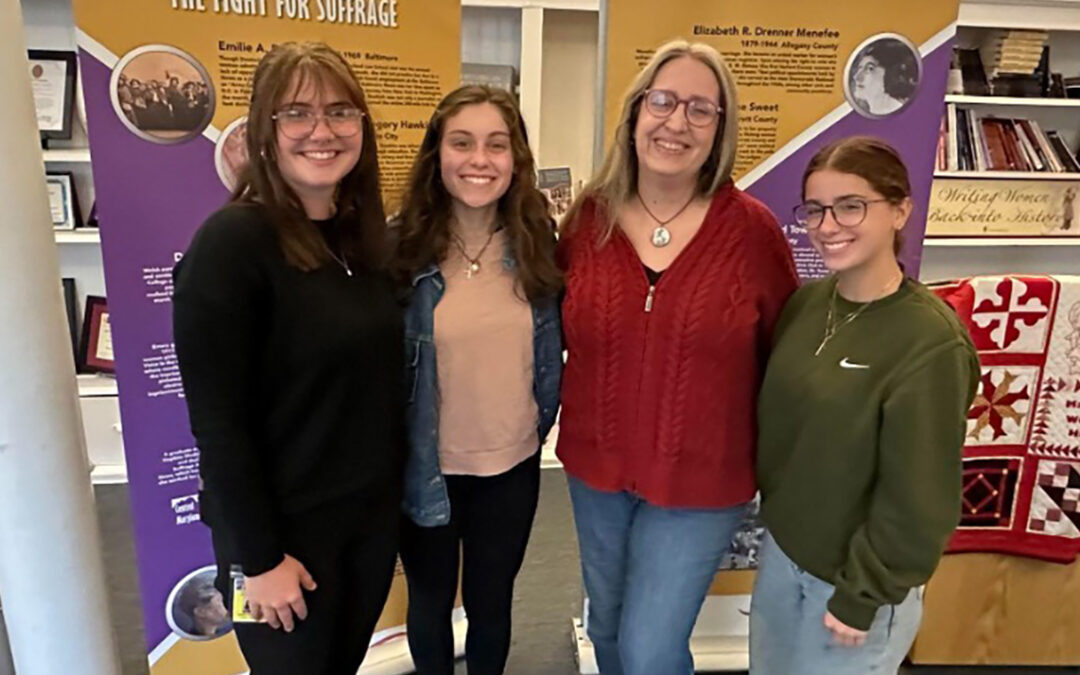Layne Bosserman was known as “The Baby” when she worked at the Woman’s Industrial Exchange for about 2 ½ years from the late 1990s to around 2000, when the Exchange was being revitalized. When she began working at the Exchange, Marguerite Schertle had recently retired and Layne assumed her section in the lunchroom. Layne sometimes served the Down Under Club and noted that the top-selling items in the restaurant were the lemon meringue and chicken pot pies. Referencing the iconic baby blue work uniforms with white bows, waitresses would all change into their uniforms upstairs where each waitress had their own cubby to store their belongings.
Layne emphasized that she enjoyed the tomato aspic platter with chicken salad, a piece of lettuce, a deviled egg on the side, and Miss Dorothea’s lemon meringue pie for dessert. But, Layne said that servers often could not enjoy these dishes since they sold out within 15 minutes of the lunchtime rush, with some items like pie being ordered on the phone by customers before they came in to dine. She would often eat lunch with Phyllis Sanders, Trish Hall, and Charlotte Zimernack before lunch started for the public and after the breakfast crowds had left, where she would hear stories from her colleagues about shopping and seeing movies together back in the 1940s. Layne served Maryland names like former Senator Julian Lapides, who even wrote letters of recommendation for Layne when she began her career as a librarian at the Enoch Pratt Free Library, and news anchor Donna Hamilton, who would often dine with her daughter.
Layne also enjoyed chocolate cupcakes with orange icing from the cupcake counter whenever they were available and would sometimes purchase items from the consignment shop, including big teddy bears that Layne would buy as shower gifts for her friends who were pregnant, and household items like tea towels, even after she stopped working at the Exchange.
Layne noted the elaborate plastic bucket system where a bucket was attached to a rope in which hot food orders would be dropped between the basement steps, pulled up on the rope, signaled by a bell, and retrieved by Miss Dorothea Wilson, who would then prepare the order. The dumbwaiter was located in the basement, so when orders were ready, Miss Dorothea would knock on the dumbwaiter, and whoever was in the kitchen and heard the knocks would pull the rope with the plates of food on it into the upstairs. Meanwhile, Miss Sabina handled the cold food and used a small toaster to toast individual pieces of bread for chicken salad sandwiches. The popularity of the Exchange did not test its value of old-fashioned techniques. Layne and her fellow colleagues wrote all orders down on notepads, even when other restaurants used electronic systems to send orders to the kitchen. Orders of cold and hot food were recorded on separate tickets. Looking back on these perhaps antiquated practices, Layne especially appreciated the positive and vintage atmosphere with the older, experienced waitresses she worked with, enjoying a sense of family and community at the Exchange, especially since there is no longer anything quite like it that remains in Baltimore.
Quotes from Layne Bosserman’s Interview:
“I never heard anyone complain about how long their food took. They were just here to be here.”
“It was a wonderful place to work.”
“I always say we need a Woman’s Industrial Exchange food truck, we just have to get the recipe for tomato aspic.”
“I had a gentleman who was an economist. I still can remember exactly what he ordered to this day. He would just sit there and do equations and eat his lunch. He’d come in and I’d just give him a thumbs up, he’d give me one back, and I’d write down his order and then we would put it in the kitchen. He got a glass of orange juice, a glass of milk, a piece of tomato aspic, and a chicken salad sandwich.”
“Donna Hamilton, from the news, came in quite often with her daughter. Meatloaf was her favorite thing.”
“The reason why that bench is at the top of the steps…that’s where people sat waiting for a table. So, it was constant turnover and it was not for a very long time. I was here for lunch from 11 to 3, and it was packed. And not to mention there was to-go orders and the bakery. That door just rang and rang and rang.”
“It was not unusual for those [older] customers, around the holidays, like around Christmas, for them to give you a Christmas card with money in it. They just treated us so well, but you did hustle.”
“Don’t go in the exit door, you heard it. Not to mention you could knock someone over with a tray full of food, but at the end of the day Miss Phyllis would say, ‘you went in that out door a few times.’”
“A lot of the women just felt elegant to me because they came to work like they were dressed to go out for the evening and they talked about their husbands and their families. A lot of them helped support their families by having this second job and then it just became a place that they loved.”
“Any history of Baltimore should be saved. All these little places need to be remembered. It’s weird to see a generation that doesn’t remember it.”
“Anytime that women are working together to help each other, especially in that time, needs to be remembered, and hopefully it’ll inspire one person in the future to do the same thing.”
Sources:
“Interview with Layne Bosserman.” Jensen Armstrong et al., March 23, 2023.
“Stories Left Behind: Who Were the Women Behind the Woman’s Industrial Exchange?” Baltimore Banner, March 30, 2023.
“Tomato Aspic at the Woman’s Industrial Exchange.” Old Line Plate, May 14, 2023

